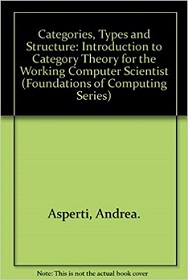
|
FreeComputerBooks.com
Links to Free Computer, Mathematics, Technical Books all over the World
|
|
- Title Categories, Types, and Structures: An Introduction to Category Theory for the Working Computer Scientist
- Author(s) Andrea Asperti, Giuseppe Longo
- Publisher: The MIT Press (August 23, 1991)
- Hardcover/Paperback: 320 pages
- eBook: PDF
- Language: English
- ISBN-10: 0262011255
- ISBN-13: 978-0262011259
- Share This:

|
Category Theory is a mathematical subject whose importance in several areas of computer science, most notably the semantics of programming languages and the design of programmes using abstract data types, is widely acknowledged.
This book introduces category theory at a level appropriate for computer scientists and provides practical examples in the context of programming language design. "Categories, Types and structures" provides a self-contained introduction to general category theory and explains the mathematical structures that have been the foundation of language design for the past two decades.
The authors observe that the language of categories could provide a powerful means of standardizing of methods and language, and offer examples ranging from the early dialects of LISP, to Edinburgh ML, to work in polymorphisms and modularity.
The book familiarizes readers with categorical concepts through examples based on elementary mathematical notions such as monoids, groups and toplogical spaces, as well as elementary notions from programming-language semantics such as partial orders and categories of domains in denotational semantics. It then pursues the more complex mathematical semantics of data types and programs as objects and morphisms of categories.
About the Authors- N/A
- Category Theory
- Functional Programming
- Theory of Programming Languages
- Mathematical Logic - Set Theory, Model Theory, Proof Theory, Computability, etc.
- Graph Theory

- Categories, Types, and Structures (Andrea Asperti, et al)
- The Mirror Site (1) - PDF
- The Mirror Site (2) - PDF
-
 An Invitation to Applied Category Theory: Seven Sketches
An Invitation to Applied Category Theory: Seven Sketches
Category theory is now a powerful tool in science, informatics, and industry. This book offers a self-contained tour of applied category theory. Each chapter follows a single thread motivated by a real-world application and discussed with category-theoretic tools.
-
 Topology: A Categorical Approach (Tai-Danae Bradley, et al)
Topology: A Categorical Approach (Tai-Danae Bradley, et al)
A graduate-level textbook that presents basic topology from the perspective of category theory. Many graduate students are familiar with the ideas of point-set topology and they are ready to learn something new about them.
-
 Basic Category Theory (Tom Leinster)
Basic Category Theory (Tom Leinster)
Assuming little mathematical background, this short introduction to Category Theory is ideal for beginning graduate students or advanced undergraduates learning category theory for the first time.
-
 Category Theory for the Sciences (David I. Spivak)
Category Theory for the Sciences (David I. Spivak)
Using databases as an entry to Category Theory, this book explains category theory by examples, and shows that category theory can be useful outside of mathematics as a rigorous, flexible, and coherent modeling language throughout the sciences.
-
 Category Theory for Programmers (Bartosz Milewski)
Category Theory for Programmers (Bartosz Milewski)
In this category theory for programmers, the author illustrates all major concepts using computer code. You are probably aware that functional languages are closer to math than the more popular imperative languages. They also offer more abstracting power.
-
 Category Theory for Computing Science (Michael Barr, et al.)
Category Theory for Computing Science (Michael Barr, et al.)
This book is a textbook in basic category theory, written specifically to be read by people in computing science. It expounds the constructions we feel are basic to category theory in the context of examples and applications to computing science.
-
 Category Theory in Context (Emily Riehl)
Category Theory in Context (Emily Riehl)
This book introduces the essential concepts of category theory: categories, functors, natural transformations, the Yoneda lemma, limits and colimits, adjunctions, monads, Kan extensions, and other topics.
-
 Categorical Homotopy Theory (Emily Riehl)
Categorical Homotopy Theory (Emily Riehl)
This book develops abstract homotopy theory from the categorical perspective with a particular focus on examples. It helps consolidate and simplify one's understanding of derived functors, homotopy limits and colimits, and model categories, among others.
-
 Higher Topos Theory (Jacob Lurie)
Higher Topos Theory (Jacob Lurie)
This book presents the foundations of Higher Topos Theory, using the language of weak Kan complexes, and shows how existing theorems in algebraic topology can be reformulated and generalized in the theory's new language.
-
 Programming in Martin-Lof's Type Theory: An Introduction
Programming in Martin-Lof's Type Theory: An Introduction
This book focuses on the type theory developed by Per Martin-Lof. It contains a thorough introduction to the Martin-Lof's Type Theory, with information on polymorphic sets, subsets, monomorphic sets, and a full set of helpful examples.





